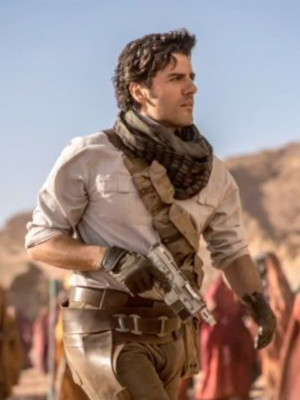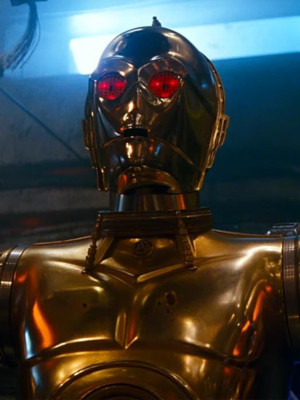
Welcome back to the ongoing Emerging Scholars Network Sci-Fi Film Festival! I’m having conversations on various classic and current science fiction movies. Feel free to watch along and join the conversation. This week’s film is 2019’s Star Wars: Episode IX – The Rise of Skywalker. The conclusion of the 40+ year Star Wars saga was too big for one guest, so this week I’m joined by previous contributors Mike Beidler and Sam Blair and new addition to the festival Will Rose. The conversation was also two big for one post; last week we took a look at the Dark Side of the Force and this week we turn to the Light.
In The Last Jedi, Rey learned she could not depend on her parents, mentor (Luke) or peers (esp. Kylo Ren) for identity and direction. In The Rise of Skywalker (TRoS), family legacy and her connection to Jedi of the past strongly influence her story. How do you understand the balance of self-actualization and one’s role(s) in community or communities?
Sam Blair: I found this to be a very interesting theme in the last three films. Kylo Ren is constantly pushing himself to cast aside the past and claim his own legacy. However this involves him killing—both literally and figuratively—his good parents. With Rey, we see Palpatine push her towards her heritage rather than away from it. I think this speaks to all of us as we all have those parts of our family history and legacy that we want to claim as well as those that we want to reject. Maturity and self-actualization comes, I think, from not accepting or rejecting those things entirely but integrating them into our own narrative.
Will Rose: As I said earlier, I think this is the main theme of TRoS. Rey finally finds out that her lineage and family tree is a big deal, but then it’s not what she was hoping for; in fact, it’s scary as hell (almost literally). So she has to figure out with whom she aligns. I think of Luke’s promise and invitation: “A thousand generations live in you now.” So she is not alone and a lot of Jedi have her back, per se.
Mike Beidler: As social creatures created in the image of the triune God—which is a self-actualized, loving community in itself—I don’t believe one can truly (and benevolently) self-actualize without support from others, be it our families, friends, worship communities, supporters, the Holy Spirit, or—as in Rey’s case—a thousand generations of Jedi Knights who have come before. We all stand on the shoulders of giants, both seen and unseen (Hebrews 12:1).
We learn that Poe has a criminal past. Breaking from that past seemed to involve a break from his former community. How can we navigate our relationships to individuals and communities from our past when our values are no longer aligned?
SB: I think this question speaks to many of us who are trying to navigate the current political and religious climate. Friends and family may have very open and strongly held positions that are different from our own.

WR: Yeah, this is the big question right? “With whom do we align when our values shift, change or become deconstructed?” We live in really polarized times, and even among Star Wars fans, believe it or not. Just as characters in a story evolve and grow, I believe we do as well. How do we navigate this journey and process? Well, through friendships and relationships that support and challenge as you evolve and grow. I love the line Han gives soon-to-be-Ben-again Kylo: “Your mom may not be around, but what she stood for is still strong” (or something like that). I think it’s important to be a part of communities and relationships who are not just echo chambers for your own opinions; it’s important to have people who can call you out and hold you accountable when you get off track.
MB: Although I’m not a former criminal like Poe, there are several former “communities” theological in nature from which I’ve had to break over the course of my adult life—from soteriology to eschatology to protology to the nature of Scripture—after wrestling with the evidence, whether it be biblical, philosophical, scientific, or a combination thereof. I would argue that certain theological positions can be seen as “values,” for we will either give more credence to certain arguments that bolster our newfound paradigms or consider less worthy certain arguments that once advanced the positions we previously held and now find wanting. As I’ve endured my own multifaceted journey of faith, I’ve discovered that Will is correct: The best way to navigate my relationships with those individuals and communities with whom I once shared certain theological positions was to (re)emphasize those areas of our shared faith writ large and cultivate the love between us while not over-emphasizing the new positions I’ve adopted, allowing us “room to breathe” and ask questions and discuss as the Spirit leads. As a case in point, I currently attend two churches: my “former” church for early Sunday morning adult Bible study and to maintain the friendships I built during the years I attended, and my “home” church for late-Sunday morning worship with my family and participation in its various ministries. I find this approach also useful in navigating the complex creature that is Star War fandom, with its older-generation Original Trilogy Purists, its younger-generation Prequel Trilogy Neophytes, less-fanboyish “casuals,” and movie critics (both professional and armchair) who have lost touch with their inner child.
C-3PO knows the translation of a crucial Sith text but is not allowed to speak the words. This sets up a Trolley Problem where he must lose his autonomy to save the lives of others. Does his status as an android change the ethics of this situation? Was it ethical for his creator(s) to introduce such restrictions and create the possibility of such a scenario in the first place?
SB: I think the first question here would be how much autonomy C-3PO had in the first place. The droids in the Star Wars universe have varying degrees of autonomy based on their role and complexity, and both R2-D2 and C-3PO have pretty high levels of autonomy in the films. I think we as an audience were more impacted by C-3PO’s loss of the memory of his friends than by the loss of his autonomy. That, and the fact that he was one character present in every Skywalker saga film, makes that scene much more poignant and impactful.
MB: For what it’s worth, the Star Wars: The Rise of Skywalker: The Visual Dictionary states that “the strictures of the Old Republic have long banned the open sharing of Sith knowledge,” hence the “hard-wired protocols” in standard droid programming, including Threepio’s inability to “consciously” translate Sith runes. Since our own planet’s development of artificial intelligence (AI) is still in its—pardon the projection of my biologicalist tendencies onto purely mechanical creations—“infancy,” I can only imagine that similar restrictive programming would reflect the ethics predominant in our own human society. Star Wars comics and novels, throughout the history of the franchise, especially the recent Solo: A Star Wars Story, have touched on the issues of “droid rights” and whether certain classes of droids are, in fact, sentient beings that deserve such rights.
Sam, your question about how much autonomy Threepio has made me think immediately to the question of human cognitive disabilities and how they relate to the concept of the imago Dei.

SB: Yes, that would be an interesting direction to take. Memory is very much entwined to our sense of self and personhood. I work with many adults with memory impairments, and this loss can be tremendously difficult for them as well as their families. Yet they can also be tremendously tender, joyful, and heartwarming. They give and love without reservation or self-concern, which is certainly at the heart of the imago Dei.
WR: Very good points by Sam and Mike. I do like that C-3PO is a type of glue for all nine films, but I think this was another set-up to pull our heart strings to “kill off” C-3PO, only to bring him back to R2-D2; it was impactful, but it’s just one of the few moments during which I rolled my eyes. Him not being able to translate Sith seemed weird for me, almost like C-3PO would be in danger in turning to the dark side if he studied it.
SB: I think it’s less a matter of a droid being turned—though that’s an interesting idea—and more a matter of forbidden knowledge. Droids, being governed by programming and less by an internal sense of right and wrong, could be made to translate and disseminate Sith teachings whereas other individuals would be more able to resist or even die to prevent its translation.
AW: At least they didn’t have to throw Threepio into a fire to have him reveal the dark language he contained. I have lots of questions about how droids actually work in Star Wars, but I’m not sure they can be resolved, so instead I’d like to go back to the imago Dei point. I find myself less comfortable with notions of the imago Dei which revolve around human exceptionalism and individual capabilities for precisely the reason that they can open the door to questions about relative abilities between humans. Corporate notions of imago Dei and notions which emphasize an appointed role seem to avoid those particular concerns.
MB: I agree with Andy that the notion of imago Dei should be tied less to the degree of individual human exceptionalism (especially in contrast to others) and tied more to a being’s capacity to reflect the love of God. I, for one, don’t believe that the imago Dei is something that emerged in our species during the course of its evolutionary development; rather, I believe God conferred this responsibility of serving as his image, or representative, on Earth by his own wisdom and counsel (and decidedly not ours, per the book of Job). As one who believes by faith that the cosmos is filled with life, including intelligent species capable of serving as God’s image to their own kind—and perhaps to other extra-terrestrial species (cf. Mary Doria Russell’s The Sparrow and its sequel, Children of God)—I think this is a very interesting conversation, especially as it pertains to the indisputable existence of other intelligent species in both the Star Wars and Star Trek universes (God forbid I fail to mention the Marvel and DC universes) and how they perceive and ascribe “rights” (or imago Dei-like qualities) to other “races” of intergalactic beings (or extragalactic, if you prefer Star Wars Legends’ Nagai, Tof, Maccabree, Faruun, and—most infamous of all—Yuuzhan Vong).
Mike Beidler is a retired U.S. Navy commander whose combination of military aviation experience and Star Wars fandom pedigree launched him, beginning in the mid-’90s, into a decades-long relationship with numerous Star Wars authors. His direct contributions to the Star Wars universe include work on Tom Veitch’s Dark Empire saga, A. C. Crispin’s Han Solo trilogy, and John Whitman’s Galaxy of Fear series. He has, in a galaxy far, far away, worked as a forensic specialist for a Hutt crime lord, studied with the B’omarr monks of Tatooine, and hunted down a bounty or two. He has also written about Star Wars and Blade Runner for Sequart Organization. In this galaxy, however, he lives in northern Virginia with his wife and three children and takes advantage of his daily 45-minute commute to/from the Pentagon to read theology and science fiction. Mike is President of the Washington DC chapter of the American Scientific Affiliation (ASA), a contributing writer to BioLogos, and a member of the both the American Association for the Advancement of Science (AAAS) and the National Center for Science Education (NCSE).
Samuel Blair is a full time Chaplain with Bridges Hospice in Pittsburgh, PA, and has been involved in hospice care since 2003. He recently completed certification to become a Board Certified Chaplain and Certified Pastoral Counselor through the Pittsburgh CPSP chapter. He began in hospice care at Connecticut Hospice in Branford, CT where he volunteered during seminary at Yale Divinity School. He has also been involved in geriatric psychology, psychiatric testing, the philosophy of religion, counseling and health care. He received the BS and MA degrees in psychology from Geneva College and the MDiv from Yale Divinity School. He loves music, needs to read more, and tries not to take things so seriously.
Will Rose is the Parish and Administrative Pastor at Holy Trinity Lutheran Church and Lutheran Campus Ministry in Chapel Hill NC. Will has a passion for engaging the intersections of faith, fandom and all things geeky. The first movie he ever saw in the theater was Star Wars “A New Hope” in 1977 and has been a lifelong Star Wars fan ever since. Along with engaging healthy conversation between Faith and Science he also leads a “God Loves Geeks” book club and moderates panels at NC Comic Con in Durham and Raleigh NC.
Andy has worn many hats in his life. He knows this is a dreadfully clichéd notion, but since it is also literally true he uses it anyway. Among his current metaphorical hats: husband of one wife, father of two teenagers, reader of science fiction and science fact, enthusiast of contemporary symphonic music, and chief science officer. Previous metaphorical hats include: comp bio postdoc, molecular biology grad student, InterVarsity chapter president (that one came with a literal hat), music store clerk, house painter, and mosquito trapper. Among his more unique literal hats: British bobby, captain’s hats (of varying levels of authenticity) of several specific vessels, a deerstalker from 221B Baker St, and a railroad engineer’s cap. His monthly Science in Review is drawn from his weekly Science Corner posts — Wednesdays, 8am (Eastern) on the Emerging Scholars Network Blog. His book Faith across the Multiverse is available from Hendrickson.

Leave a Reply